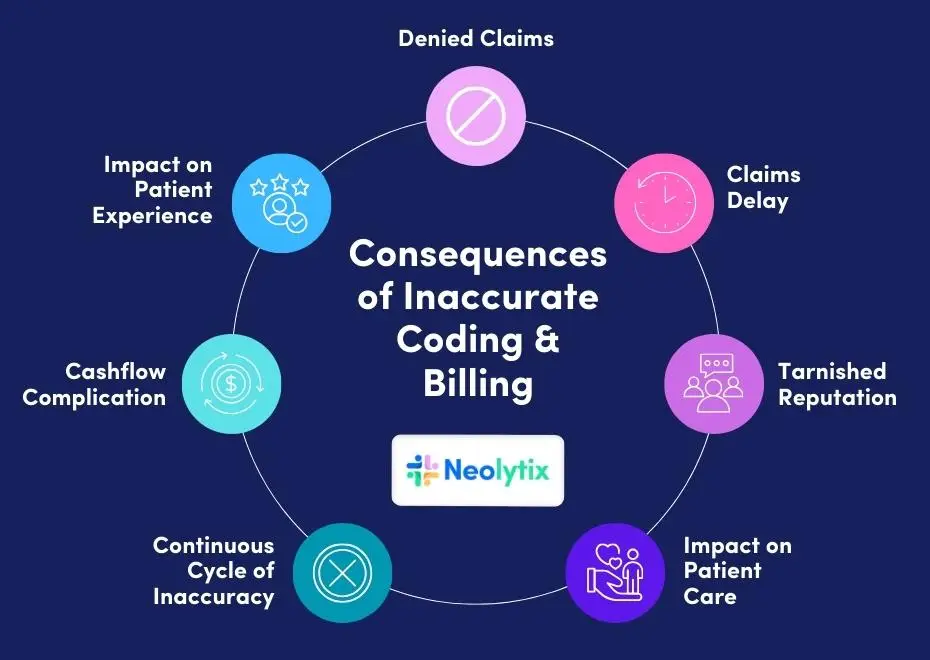Within revenue cycle management and healthcare operations , accuracy is paramount, with coding and billing playing pivotal roles in the seamless functioning of medical practices and facilities. A misstep in these processes doesn’t just affect financial aspects but sends ripples through the quality of patient care.
This article explores seven significant consequences of inaccurate coding and incorrect billing, shedding light on their implications for healthcare facilities, medical practices, and, most importantly, patients.

1. Denied Claims: The Barrier to Reimbursement
Inaccurate coding significantly heightens the chances of denied claims, as errors in Current Procedural Terminology (CPT) codes or International Classification of Diseases (ICD) codes act as gatekeepers to reimbursement. Denied claims not only delay revenue but also demand additional administrative efforts to rectify and resubmit claims, disrupting the seamless flow of billing processes.
This can lead to prolonged waiting periods for patients expecting insurance coverage, impacting their financial well-being and potentially delaying crucial medical interventions.
2. Financial Fallout: The Ripple Effect on Healthcare Budgets
Incorrect billing practices directly impact the financial health of medical practices and healthcare facilities. Denied claims, coupled with potential legal consequences for fraudulent billing, result in substantial financial losses. The repercussions extend through the entire revenue cycle, affecting budgets, investments in technology, and, ultimately, the ability to provide quality patient care.
This financial strain may force healthcare providers to compromise in resource allocation, affecting the availability of advanced medical technologies and reducing the scope for continuous staff training, ultimately impacting the patient experience.
3. Fraud and Abuse Allegations: Tarnishing Reputation
Inaccurate medical coding opens the door to allegations of fraud and abuse. Coding errors, intentional or not, can be misconstrued, leading to investigations and legal proceedings. Such allegations tarnish the reputation of healthcare providers and divert resources away from patient care to address legal challenges, indirectly impacting the patient experience.
Patients may lose trust in healthcare facilities facing legal scrutiny, affecting their willingness to seek necessary medical attention and potentially compromising their overall healthcare journey.
4. Impact on Patient Care: The Diversion of Resource
At the heart of healthcare is the commitment to providing quality patient care. Inaccurate coding and billing practices divert attention and resources from this mission. The constant need to address coding errors and billing discrepancies strains medical staff, impacting the time and attention they can dedicate to patients.
Overworked and stressed medical professionals may find it challenging to uphold the highest standards of care, potentially diminishing the overall patient experience.
5. Claims Processing Delays: The Slow Lane to Reimbursement
Inaccurate coding can significantly slow down the claims processing workflow. The time and effort required to rectify coding errors extend the duration between providing services and receiving reimbursement. This delay in claims processing creates cash flow challenges for medical organizations, affecting their ability to invest in updated technologies and maintain efficient operations, indirectly impacting patient care resources.
Patients may experience frustration and anxiety due to delays in settling medical bills, potentially influencing their perception of the healthcare facility’s efficiency.
6. Compromised Coding Systems: Erosion of Trust in Accuracy
Persistent inaccurate coding erodes the integrity of coding systems within a healthcare facility. If errors are not promptly addressed, trust in the accuracy of codes diminishes over time. This compromised coding system perpetuates a cycle of errors, hindering the overall efficiency of medical coding and billing processes and potentially impacting the patient experience through prolonged administrative procedures.
Patients may perceive inconsistencies in their medical records, leading to concerns about the reliability of healthcare information being used to guide their treatment plans. Read more about medical coding audits here
7. Negatively Impacting Billing Processes: The Domino Effect
Beyond denied claims and financial repercussions, inaccurate coding can have a cascading effect on billing processes. The intricacies of medical billing require meticulous attention to detail, and inaccuracies in coding can disrupt the entire billing workflow.
This, in turn, affects the timely submission of claims and reimbursement, creating a domino effect on the financial stability of the healthcare facility and indirectly influencing the resources available for optimal patient care.
Patients may experience disruptions in the billing process, leading to uncertainties about their financial responsibilities and potentially impacting their satisfaction with the overall healthcare experience.
Conclusion
The consequences of inaccurate coding and incorrect billing extend far beyond administrative inconveniences. They can potentially jeopardize the financial well-being of healthcare providers, compromise trust in coding systems, and, crucially, impact the quality of patient care and the overall patient experience.
Healthcare facilities and practitioners must invest in rigorous coding and billing best practices, utilizing the right technologies and training to mitigate these consequences and uphold the standards of excellence in healthcare provision. As the ultimate beneficiaries of healthcare services, patients deserve a seamless and reliable healthcare experience that accurate coding and billing practices can provide.
Neolytix has provided medical billing and coding services to healthcare organizations for over 12 years. Contact us today to schedule a demo and learn how we can improve reimbursements, reduce accounts receivable, decrease inefficiencies, and maximize collections while keeping your patients happy.




